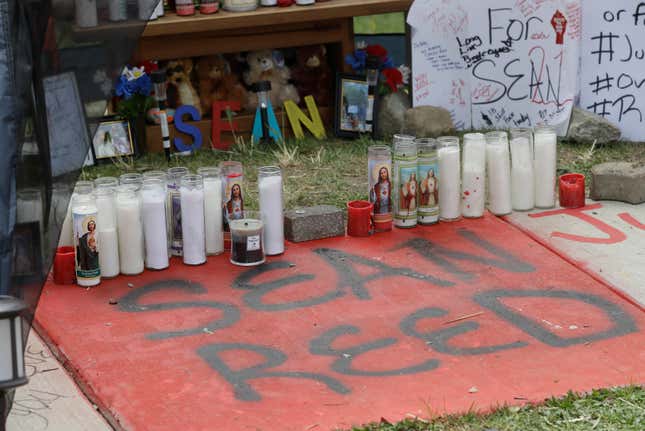
More than six months after 21-year-old Dreasjon “Sean” Reed was fatally shot by an Indianapolis Metropolitan Police officer after a live-streamed high-speed chase, Special Prosecutor Rosemary Khoury and other members of law enforcement gathered at the Indiana State Police Museum on Tuesday night to announce whether a grand jury decided to bring criminal charges against the cop who shot him.
According to Khoury, the jury found “insufficient evidence to indict or accuse” Officer Dejoure Mercer in Reed’s killing, reports the Indianapolis Star.
Khoury, who is Black, fought through tears as she delivered the announcement.
“I don’t know how Mr. Reed’s mother feels, but I’m a mother of two Black boys,” Khoury said.
“I am also very empathetic toward Officer Mercer. I know that had to be a difficult position to be in,” she continued. “No one wins.”
Both Mercer and Reed are Black.
Mercer was among several Indianapolis Metropolitan Police Department officers, including Chief Randal Taylor, who pursued Reed on May 6 for driving recklessly. Reed live-streamed the chase, which was called off by police at one point because of how fast Reed was driving.
About 15 minutes into the chase, Reed pulled over and pleaded for one of the thousands of people watching him on Facebook Live to come get him. Mercer was nearby and pursued Reed on foot.
The video went dark, but audio could still be heard of Reed running from Mercer. At one point, Reed could be heard crying out in pain and seemed to collapse on the ground. Gunshots ring out and, moments later, an officer later identified as Steven Scott can be heard saying, “Looks like it’s going to be a closed casket, homie.”
According to law enforcement, Mercer shot at Reed after a Taser deployment was “ineffective.” Police say Reed rolled on his back and fired two shots at Mercer after being stunned and falling to the ground, and that Mercer returned fire. Indiana State Police say Reed’s gun matched cartridges found in two previous drive-by shootings, and that evidence on his phone further connected to those incidents, which didn’t result in any injuries.
Reed’s family and their attorneys deny that Reed owned or fired a weapon at police officers. They filed a lawsuit against the city and several officers involved in the chase, including Officers Mercer and Scott, as well as Chief Taylor and Deputy Chief Kendale Adams.
Khoury didn’t answer several questions about the evidence her office presented to the grand jury. Because the proceedings are secret, it’s likely the public may never know who testified about Reed’s killing or what evidence was presented. A separate press conference was held on Tuesday in which ISP walked through their timeline of what happened.
“I have to believe that justice was done because I trust our system, our judicial system,” Khoury said.
Reed’s killing triggered protests in Indianapolis nearly a month before George Floyd was slain by a Minneapolis police officer. Since his death, IMPD started rolling out body cameras for its police force—a reform that community members and city officials “have long called for,” wrote the Indianapolis Star. There was no body camera footage of Reed’s killing.
Dozens of protesters rallied shortly after the grand jury’s announcement on Tuesday night. The African American Coalition of Indianapolis also released a statement following the decision.
“We like to believe that justice is clear, recognizable and a product of a collective consensus. Justice should be obvious,” the group said. “However, too often when it has come to the death of Black males in police action shootings there has not been a clear, recognizable, and collective community consensus on whether justice has been achieved.”
“There was no justice served. My brother is [not] resting well, there’s no way,” Sean’s sister, Jazmine Reed told WRTV. “So now we have to go on every day. I have to have my son, we have to go on every day with life. My brother can’t see his nephew coming into this world, he can’t enjoy his niece any more, his mother, his father, his other two sisters.”

